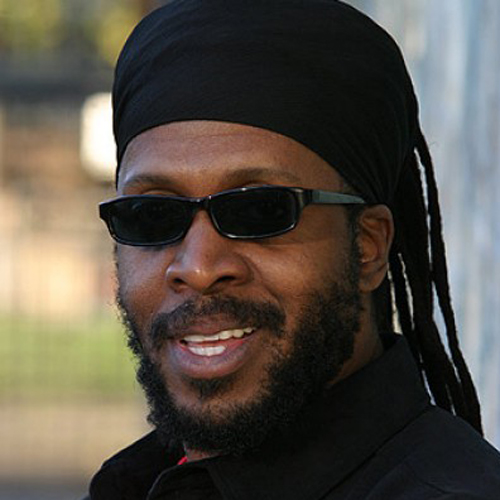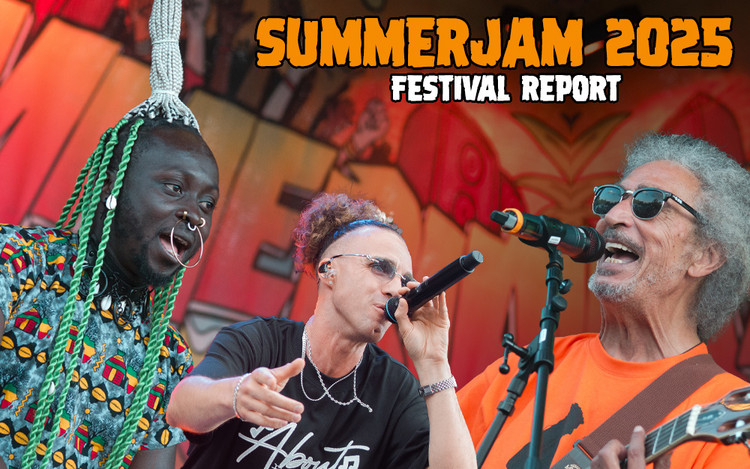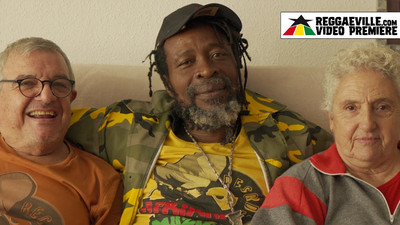iNi Kamoze ADD

"Out in the street, they call it murder.... when riddim spacing out ya head..." echoes iNi Kamoze. One of the most admired things about Jamaican reggae artistes has been their ability to suddenly emerge from the depths of oblivion to considerable attention and success. There is no better example of this than iNi Kamoze. Only a few Jamaican artistes have paid the kind of dues he has paid. Kamoze recounts hanging out at Duke Reid's Treasure Isle studio, watching Mikey "Dread At The Control" Campbell working the boards. Often, the much feared Duke would chase him out of the studio as an idler, gun in hand.
Kamoze is the son of a tough police superintendent dubbed "The Scorpion", and a factory worker mother. He was born in a seaside shack in Oracabessa, Jamaica. His mother, in a fit of anger over not hearing from his father, placed the infant in a cardboard box and left him at the gate of another female acquaintance (of his dad) in a Kingston ghetto called Jones Town. The woman, Miss Ette, still claims him as her little son. As a young boy, Kamoze was sent to live with his grandfather, where he showed great promise and was touted to become the doctor of the family. However, this was not to be, as he copped out of high school and hitchhiked his way to Kingston and turned to hustling in the Bond street area.
Kamoze's friend, Tallis, recounts one Sunday evening; "Nika" (as they nicknamed Kamoze) and two other yout' stand up on the corner at Charles and Bond street, when all of a sudden some police jump out of them jeep. One a them say, "where ya live?" Nika point up the street and say up there sah, but that time him never live nowhere. Him used to sleep on top of that shop there (pointing to a flat roofed structure on the corner). The cop say, "run"! Till this day I don't know why they tell him to run, but as soon as he turned, gunshots bark and the two other man them dead. They were armed." Tallis continues, "Nika is the luckiest yout' I know."
Kamoze moved to the politically charged Spanish Town area and took to the Rastafarian way of life. Years later he would point to this as what saved him, after asking an acquaintance from his old neighborhood for seven youths he ran with and learned that six of them had met violent deaths. Encouraged by a newscaster, the late Leo Ferguson - who always took him to Radio Jamaica - Kamoze pushed himself as a playwright (his hit comedy "The Runnings" was talked about for a long time). He wrote a picture history book; "Port Royal: the Richest and Wickedest City on Earth", and crafted his singer/songwriter skills. Many would later tout him as one of the best songwriters out of Jamaica.
Every Friday evening Kamoze would visit the home of reggae icon Jimmy Cliff to eat ital food and talk about music. On one of these occasions Kamoze was telling his friend Newton Merritt (Cliff's nephew) that he was giving up this music thing because "it nah work fi I". Kamoze by this time had done three moderately successful singles on the Mogho Naba label. Only one radio personality would give him any air-play, Dermott Hussey. Says Merritt, "He had six of the toughest tracks I ever heard on this demo tape, so I called Sly (of Sly and Robbie fame) and gave him the tape. Sly forgot about the tape for some time, but stumbled on it one day and popped it in his deck. Recalls Sly, "I couldn't believe it, it was the wickedest thing since Bob Marley. I called Robbie and said we have to record this now, right now!".
All six songs - recorded at the Channel One Studio in one hour - became major hits and resulted in one of the biggest selling reggae albums of the time (self titled/Island label). But he was still broke. In a conversation with Jimmy Cliff Kamoze asks, "How come my song so popular and me don't have no money?" Cliff grinned and said "Happen to me too, man. Happen to me too". The Sly and Robbie association yielded two more albums on Island, but by then Kamoze was unhappy with the direction of the synthesizer based music, so he brought in former Bob Marley and the Wailers keyboard player Tyrone Downie and formed the One Two Crew. Together they recorded the popular "Shocking Out" album (RAS Records/ Greensleeves). The hit single "Hole In The Pumpkin" was banned by the local radio and TV networks for its political overtones. Political thugs would routinely turn up at his gate. He then teamed with producer Phillip "Fattis" Burrell and recorded "Hotter This Year", the biggest dancehall anthem of the period.
In 1991 iNi Kamoze vanished from the music scene amid rumors of incarceration (he declined to comment on this period when asked on several occasions). A Brooklyn associate remembers, "He was standing right here on Flatbush Avenue beating his chest and saying, "I going 'be the biggest ting bout ya! One way or another." Then the lights went out on him. He stormed back on the scene in a mean way three years later with the historic "Here Comes The Hotstepper" [Sony/Columbia]. Salaam Remi, a young New York kid who gets production credits on the Billboard chart topper, grins and teases Kamoze by calling him "eenie kameenie kamynie kamoze. "Nika was outside in the rain, trying to get people to come sing the background on the song; anybody he could find, homeless, junkie, whoever.
Some crazy sh*t". The New York Daily News Jim Farber proclaimed; "Hotstepper" is a dancehall ticket to the top." History was been made as it was the first time a Jamaican reggae artiste topped the pop charts. Newton Merritt talks about how he [Kamoze] was always asking "How come you never hear iNi Kamoze played behind Madonna or Michael Jackson"? "Y'know, we had that Hotstepper joint for about three years? We knocked on every record company's door. They were like ...where ya goin' wit' that"? EPMD's Parish Smith was like, "Son, you gotta come wit' some harder sht." But people don't realize how determined iNi Kamoze is because he acts so cool. If you tell him "no" at the front door, he'll walk away and come through the back."
Columbia's Maxine Stowe included the "Here Comes Hotstepper" track on the Stir-It-Up dancehall compilation, only because they were unable to use a previously selected song. When Hot 97's Funk Master Flex jumped on the jam and the street started to buzz, Columbia was frantically trying to play catch-up, releasing it as the first single from the compilation. They had no plan in place to deal with the speed of this record as it climbed the charts. "Here Comes The Hotstepper" hit the #1 spot on the Billboard pop charts in 1995, and all hell broke loose. Dozens of people and their lawyers came out of the woodwork to claim a piece of the song; among them Kenton Nix, Sugar Biscuit, Chris Kenner, West End Records, et al. According to the producers, one party had earlier agreed to accept $750 for use of the Tanya Gardener's "Heartbeat" track. This was never paid, so now they were demanding $750 thousand! iNi Kamoze had the #1 song in the world, no record deal, and all royalties frozen due to claims. He was still broke.
A New York journalist asked iNi Kamoze about his new found crossover success. "Crossover?! Crossover to where? I was standing right here all the time, lots of awards and no rewards". Columbia head Tommy Motola, on hearing how much money Kamoze was asking shouted, "Who does he think he is, Bob Marley"? Kamoze was furious, "Naw I am not Bob Marley, y'all kill him already, you can't try that with me." In the ensuing war of words, it was clear he wouldn't be signed by Columbia. This news triggered a bidding war for the artiste - all the same labels who passed on him before were now clamoring for him. Columbia, meanwhile, had included "Here Comes The Hotstepper" in the star-studded soundtrack for Robert Altman's "Pret-A- Porter" (Ready To Wear) film, extending the chart life of the song, as did the Phillies baseball team making it their unofficial anthem. This was truly hot property.Kamoze reportedly inked a multi-album deal with Elektra Entertainment's East West Records, and as soon as the ink dried the Hotstepper and the Salaam Remi camp were feuding. According to Merritt, "We wanted to pay them to do the tracks but they didn't want that. They wanted to have all the money and pay us! Columbia refused to give Kamoze the rights to use "Here Comes The Hotstepper" on his new CD, and scrambled to acquire his old tapes for an album which they called "Here Comes The Hotstepper" and released it at the same time East West dropped the "Lyrical Gangster" CD. They were out to crush him. Gary Casson, VP of administration recalls "We had no idea Sony (Columbia) would go out and acquire those old masters. They were misleading the public with the album, which put the success of one single over the long term career of the artiste. It was rumored that Columbia was strong-arming program directors and disc jockeys at stations like Hot 97, not to play iNi Kamoze's music. When he went to promote the "Listen Me Tic" single on Dr. Dre and Ed Lover's morning show on Hot 97, they acted like Kamoze wasn't even there. "The fat boy had his head on the console snoring like a pig and the goofy boy was just there acting like a clown" says Kamoze.
Everyone was seeing red. Merritt confesses Kamoze and ten of their Brownsville crew were heading to the Sony music offices at 550 Madison Avenue one afternoon in April 1995 and he had to fight to keep them from doing something regrettable. He was sure even now, Kamoze would still be in jail. So, Kamoze was forced to compete against himself. This is the last thing an artiste wants to do. The ensuing market place confusion chilled his new East West release, though the single "Listen Me Tic" was a huge club hit. To make matters worse, Kamoze had developed a reputation of being hard to deal with and some influential people weren't showing him the love. When Columbia sent him platinum plaques for "Here Comes The Hotstepper", he sent them back faster than they came. Merritt still laments over the time Kamoze told
East West (Elektra) head Sylvia Rhone- after she insisted
on giving them economy tickets to the BMI awards in Los Angeles- "Yo, I can buy my own ticket...as a matter of fact, me nah deal wit' you again"!
He never did. He walked away from the contract...
iNi Kamoze remains the dark horse of music, the mystic man the late Peter Tosh sang about. Still a mystery even after selling millions of records and topping the Billboard charts. This perhaps is what has kept him fresh over the years, with a near cult following worldwide. Said a fan waiting for an autograph at New York's Madison Square Garden, "His songs are way ahead of the times, and every time you listen, the songs sound as if he just recorded them. None of his songs are old."
In this era of bubble gum songs and pinup poster gangsters, there are not many artistes who are "real". Kamoze's smile quickly disappears as he muses, "Yeah man, real to the core, like the ever faithful, ever sure, come thru' the window if you close the door."









